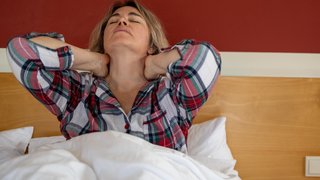Menopause is having a moment: Debunking common myths
August 2, 2024
Dr. Lutich is certified by the North American Menopause Society.

Many women approach menopause with anxiety about the future. You’ve probably heard your grandmother, mother, or aunts lament about menopause, aka “the change,” as a stressful time full of hot flashes, weight gain, and plummeting sex drive.
Life changes due to menopause and perimenopause (its prequel) are real and can easily disrupt your sleep, relationships, and overall health when you’re in your prime of life. Unfortunately, myths and misperceptions abound regarding what’s normal, what’s not, and how to safely relieve classic symptoms like night sweats and mood changes.
The good news? Menopause is having a moment. That means heightened awareness, more resources dedicated to improving women’s health, and open discussions to ensure you get the information you need.
Today, there are more options than ever to treat disruptive menopause symptoms. In our roles as women’s health specialists, we’ve seen time and again that with the right self-care and planning with your doctor, you can lead a healthy, energetic life through your 60s, 70s, and beyond.
The Centers for Disease Control and Prevention reports that the average life expectancy of a woman in the U.S. is 80.2 years. This means you may be post-menopausal for approximately half your lifetime.
It’s time society takes women’s health care in menopause more seriously to reduce stigma surrounding this time of life – and make more women aware of their treatment options. Let’s talk through common menopause misperceptions and what you can do to feel healthy and vibrant as you age.
Myth: Menopause just means you are getting old
Here’s the truth: Perimenopause and menopause are natural cycles of aging, but these in no way mean you are becoming frail or fragile.
Perimenopause is the eight to 10 years leading up to menopause. For most women, this starts in your 40s but can begin as early as the late 20s or 30s in some. In perimenopause:
- Estrogen production begins to fluctuate. This hormone helps regulate the menstrual cycle. Estrogen also affects your bones, breasts, heart, pelvic muscles, and more to help regulate genes and influence normal body functions. Low estrogen levels can cause alterations in the body, such as weakening bones, thinning skin, wrinkles, and mood changes. Fluctuation from high to low levels can produce night sweats and hot flashes.
- Ovary function slows to a stop. The ovarian follicles – small, fluid-filled sacs in the ovaries, each containing one egg – lose function and stop releasing eggs into the ovaries. That means no more periods!
Menopause refers to the cessation of menstrual periods for at least 12 months. This most commonly occurs between the ages of 45 and 55.
Myth: Hormone therapy sounds good, but I’ve heard it’s not safe
Here’s the truth: Hormone therapy – when taken under the care of a board-certified women’s health provider – is one of the safest, most effective treatments for a wide range of menopause symptoms, including:
- Hot flashes
- Mood changes
- Vaginal dryness
- Bone loss (osteoporosis)
- Urinary incontinence
- Weight gain and slowed metabolism
- Night sweats
- Chills
- Insomnia
- Thinning hair and dry skin
- Changes in libido

Hormone therapy has been found to increase lifespan, reduce the risk of colon cancer and diabetes, relieve symptoms of vaginal dryness and hot flashes, and reduce the risk of osteoporosis.
Estrogen also promotes the growth of good bacteria in the vagina. Without estrogen, the pH of the vagina increases, which can cause inflammation and bacterial overgrowth that raises the risk of UTIs and bacterial vaginosis.
Be wary of med spas and standalone, self-proclaimed hormone clinics. These providers may not have access to safe, personalized medications approved by the U.S. Food and Drug Administration.
While hormone therapy is not a fountain of youth, it can significantly reduce the symptoms of menopause. Typically, hormone therapy will consist of either estrogen alone or a mix of the female hormones estrogen and progesterone, and in some cases, testosterone. There are generally two ways to take hormone therapy:
- Systemic: This type circulates hormones throughout the body and can be taken as pills, skin patches, gels, and sprays.
- Vaginal: This type is applied directly to vaginal tissues to relieve vaginal dryness, itching, and discomfort during sex. It can also help with urinary urgency and reduce the risk of urinary tract infections. It can be taken as a cream, tablet, ring, or suppository in the vagina.
We typically recommend systemic hormone therapy for women who are perimenopausal or within 10 years of the onset of menopause. That’s because certain risk factors associated with hormone therapy, such as an elevated chance of stroke, are higher in women over age 60. However, vaginal hormone therapy is safe to use at any age and has many benefits.
Menopause and hormonal therapy are not one size fits all. Hormone therapy is a safe, effective option for most women. Depending on women’s preexisting conditions, family history, and the type of treatment being used, hormone therapy can be associated with a slightly higher risk of:
- Blood clots, with oral estrogen.
- Breast cancer, depending upon breast density, family history, alcohol use, smoking history, and whether the patient lives a sedentary lifestyle. In some cases, a specific estrogen can decrease breast cancer risk.
- Stroke, also highly dependent on personal health history and lifestyle.
Based on your own individual health and family history, your health care provider can help you find the formulation and type of hormone therapy that is best for you based on the risks and benefits.
Myth: Hot flashes and moodiness are just things women have to live with
Here’s the truth: Umm … no. While uncomfortable symptoms are common, you don’t have to “just live with” crummy sleep, low libido, or emotional changes. Most symptoms can easily be treated and managed with help from your health care provider. Here are some of the most common symptoms women worry about, along with proven, effective ways to deal with them.
Some symptoms require immediate medical care. Call your health care provider if you experience vaginal bleeding after a long gap between periods or if you have thoughts of hurting yourself or someone else. These are not normal symptoms of perimenopause or menopause and could be signs of a health emergency.
Related reading: Bleeding after menopause: It’s not normal
Myth: Menopause is going to make me lose muscle and gain weight
Here’s the truth: It’s true that as we age, we all experience sarcopenia, or loss of muscle mass. But that doesn't mean your 50s and beyond will leave you soft or weak!
You don’t have to be a gym rat to glean the benefits of exercise during menopause. You can do yoga or Pilates or put on a YouTube stretching video. You can use ankle weights while you take a walk around the block or break out the resistance bands for a 15-minute training. One study showed that physical exercise can help prevent dementia, reduce pain, and lower your risk of cardiovascular disease.
Nutrition plays a crucial role, too. A balanced diet rich in lean proteins, fruits, vegetables, and whole grains can support muscle health and overall vitality. Adequate hydration is also important, especially as we age, to maintain muscle function and joint mobility. Combined with regular exercise, a nutritious diet can help combat sarcopenia and support a healthy, active lifestyle.
Exercise and nutrition are particularly important in your 40s, as you’re going into menopause and perimenopause. Laying the groundwork can help you retain muscle mass, mobility, and agility as you move into your older years.
Menopause doesn’t have to be a time of fear
With the right treatment and care, you can live a vibrant, active lifestyle. It’s important to recognize that treatment for menopause and perimenopause symptoms isn’t one-size-fits-all. Every woman is unique, requiring personalized care and support. By breaking down common myths and encouraging candid conversations with providers, we can transform the narrative around menopause from anxiety to empowerment, ensuring that women continue to thrive through all stages of life.
To talk with menopause expert, call 214-645-8300 or request an appointment online.











